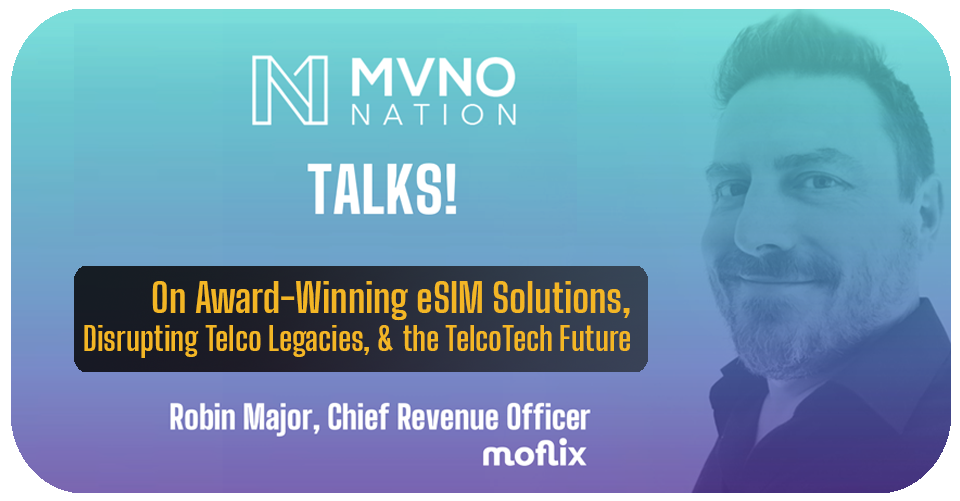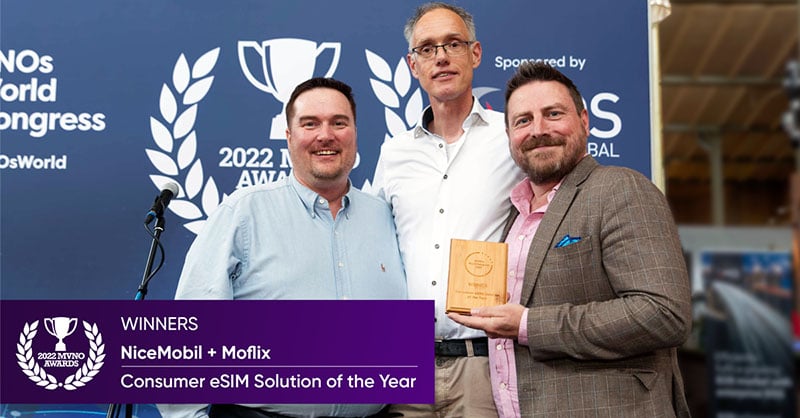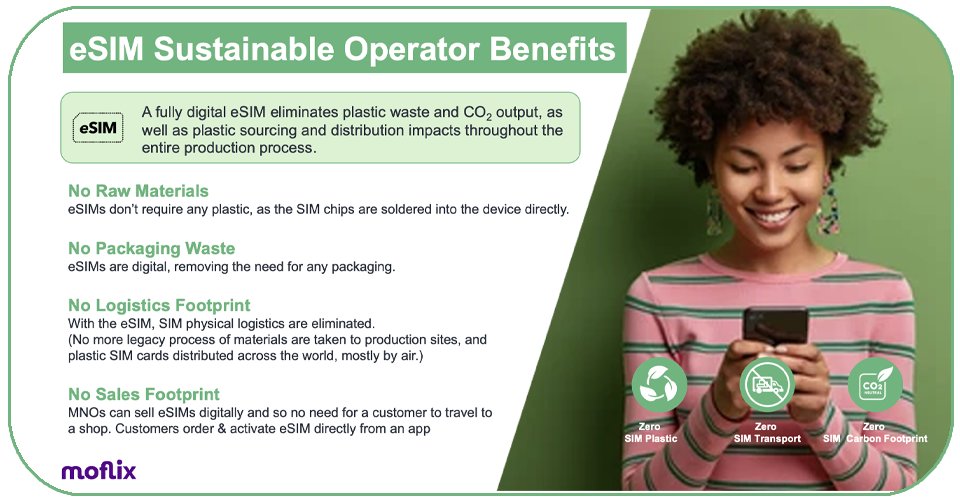MVNO Nation Interviews Moflix: Award-Winning eSIM Solutions, the Power of TelcoTech, & Disrupting Telco Legacies
MVNO Nation interviewed digital disrupter and Moflix Group CRO Robin Major.
They discuss how Moflix and NiceMobil created the award-winning "Consumer eSIM Solution of the Year," how operators must start thinking differently to break free from the chains and restrictions of legacy telco, and how TelcoTech is enabling a bright new future and growth opportunities for the industry.

00:06
Ela: Hi Robin. How are you?
Robin: I'm good. Thanks, Ela. How are you?
Ela: I'm good. Thank you. Lovely to have you here. Thanks. Please tell us a bit about yourself.
00:17
Robin: Sure. My name is Robin Major and I'm the Chief Revenue Officer at Moflix. I've been in the telco industry for about 30 years now. And for the last 10 years, I've been heavily focused on digitalisation of the Telco business model and what we can do as an industry to be a bit more modern in our thinking and the way that customers experience our products and services.
And try to bring some of the “sex and sizzle” and the exciting things that other people are doing in other industries to the Telco industry, with a very clear focus on some of our colleagues in the MVNO industry as well.
00:53
Ela: Lovely.
Tell us about Moflix and what your company does.
Robin: Sure. Well, Moflix is a startup based in Finland. We've been around for about three years now, and we were founded to rise to the challenge of modernizing the telco business model using all digital processes and capabilities, so that everything that the customer does in terms of onboarding themselves with the telco and experiencing the service, managing their relationship with them, starts and ends in a modern, mobile app. And trying to make it as easy to onboard and use the service as you would with something like WhatsApp or Netflix.
So really, reimagining the entire telco business model to be digital-first and looking for ways to sort of reduce some of the compromises that people have gotten used to working with retail stores and contact centres over the last, however many years or decades.
And I think, fortunately for us, COVID and the period we've been through in the last couple of years has pulled back the curtain a little bit in terms of the way that the telco business model has been working, and where the opportunities are to modernize, and taken away the things that people have relied on – in terms of contact centre infrastructure and retail stores, especially – and there’s been almost a natural move towards more digital ways of interacting with people. Really, that’s the opportunity we’re looking to capitalize on and help both existing telcos and new businesses who are looking to move into the telco space – so MVNOs, especially– to bring an exciting digital proposition to market.
02:36
Ela: Sounds great.
Why do you think Moflix was chosen to receive the “Consumer eSIM Solution of the Year” award and what do you think made you stand out?
Robin: That’s a very good question! We didn’t have full transparency from the judges as to what their decision-making process was and why we were specifically selected.
But I can certainly give you a few thoughts based on some of the conversations we’ve had subsequently. First of all, I’d like to do a shout-out to our customer NiceMobil in Norway. It wasn’t just Moflix that received this award. It was a joint award between Moflix and NiceMobil for the “Best Consumer eSIM Solution of the Year.”
And really their braveness of vision to do something disruptive in the Norwegian market that would appeal to a segment of customers who would take advantage of digital and eSIM to act differently in the telco market in Norway. So definitely, you know, what they’ve done in terms of their vision and the way that they’ve gone about implementing the solution has been key in driving us towards this award.

What’s different about it is the fact that this is an all-digital proposition, so everything (again) starts and ends in the app. You can discover the service on the website, or you can go to the App Store and you can download the app, but then everything that you do from that point on is done in the app.
And every part of the process has been really carefully scrutinized to be as low friction, and easy to use for the customer as possible - including the full service activation on eSIM in the app - without needing to resort to any kind of external QR codes or separate provisioning or activation activity.
So it's a really easy to use, really easy to understand proposition. There's no waiting around for a SIM to be delivered; customers can just pick up the app and onboard themselves quickly like you would WhatsApp or Netflix and start using the service really quickly and easily. And it's just been a bit of a breakthrough moment for the market - which is maybe more used to sort of legacy telco onboarding processes - to be able to sort of find the service and use it that easily.
And what the guys at NiceMobile have done is really quite impressive. They have leveraged the pre-built proposition that Moflix provides. So our "Telco in an App" experience has served as the basis for this proposition.
They were able to get live in under a hundred days from starting the project to actually launching in November last year. So I think the judges picked up on that as being of great interest and value in the telecommunication industry, where we are not used to seeing things moving that quickly necessarily. And we managed to do that without ever having physically met the guys at NiceMobil last year because it was during COVID!
So, all in all, we've had from a project perspective, a very low friction rollout experience, and the customers are having a very low friction onboarding and usage experience, and it’s leveraging new technologies in terms of the app experience and eSIM, all rolled into one. I think those things made it stand out from some of the other entries that the judges were looking at.
06:25
Ela: Fantastic.
Why should MVNOs care about eSIM?
Robin: That's another very good question! I think, again, if the last few years have taught us anything it's that people are perhaps more ready and willing to embrace new ways of doing things - and using digital capabilities- than maybe we as an industry thought was the case.
If people are willing to sort of experiment in that area (and certainly they're used to using these kinds of digital technologies and experiences from other industries), then you have an opportunity to really think differently about how the customer experiences the whole service. And eSIM really offers a great way of disrupting the market and making it easy for customers to onboard with you without having to, invest in a whole load of physical distribution & logistics - whether it be retail stores, whether it be contact centres, whether it be warehousing and having to send out plastic SIMs. And if you can, in a really easy way, attract customers to you and then activate their service in a few minutes through an app, then eSIM gives you an excellent way of winning market share and disrupting very quickly.
I think also there are a bunch of other sorts of reasons that appeal to customers nowadays. If you’re not sending out plastic to people, and you're able to appeal to the very necessary change in thinking around the environment, then obviously eSIM offers a much more environmentally friendly way of doing telecommunications business that doesn't involve pieces of plastic flying around the world, and having to be disposed of subsequently.
So, I think there are a couple of reasons why MVNOs should be looking at this: both as a disruptive mechanism for acquiring customers quickly, and minimizing time to value for onboarding people; and also as a great way of reducing the overall environmental footprint of doing business.

08:49
Ela: What are MNVOs gaining by adding eSIM to the offering and how does it help their customers?
Robin: I think we've just touched on some of those points in the previous question as well.
It's giving the world a message that you're a modern 21st-century business that wants to find a way of reaching customers quickly, and doing so in a way that's as environmentally friendly and convenient as possible.
And I think consumers are seeing businesses that are embracing eSIM and, and certainly the All Digital "Telco in an App" approach to eSIM that NiceMobil has pioneered in Norway, for example, as a very appealing kind of service provider to work with.They see these kinds of really easy-to-use services in financial services, in retail, in content provision and in other places. And they've been frustrated, I think, for a while that these kinds of capabilities aren't readily available in the Telecommunications industry to the same extent they would expect.
And when they see these kinds of offerings out there that are just easy to use, and leverage eSIM technology that's allowing them to do it without having to break up the journey and wait for the postman to arrive, or to think more carefully about their own environmental footprint in terms of using plastic and that aspect of things as well, then I think, it's a win-win for both the MVNOs and the consumers.
10:27
Ela: Amazing.
Please tell us what's next for Moflix?
Robin: That’s another great question. Obviously, when we started the company, the primary focus was modernizing the existing connectivity experience for customers, and making it easier for them to find,onboard, and use telecommunication services.
But if you look at the bigger picture of what's happening in the digital world, service providers in other industries are leveraging their existing relationships with customers to start to promote/sell/offer other things. And if you look at the financial services industry and the move to what's been called FinTech, you know, there's a lot of companies there who really modernized the bank account and the payment experience. And through a regulated relationship with the customer, where the customer's ID is formally validated, they've been able to leverage that in very interesting ways to build out the footprint of things that they can do with a strong customer base.
And we see in telecommunications the same kind of opportunity being available. So we are promoting the idea of TelcoTech, which is giving telcos the opportunity to leverage their privileged position as a regulated service provider - that provides the very thing we will need to get onto the internet in terms of connectivity - as a vehicle for becoming a TelcoTech provider of other digital services, whether that be content, whether that be different types of connectivity services, whether that be over-the-top services of some form. Or other real-world services: insurance, mobility services - whatever, really they think is important for their business model - that they have the capabilities in our platforms to be able to expand from pure connectivity plays into those adjacent and more exciting areas where they can drive new value with customers.
So we are rolling into the product a marketplace that allows that to happen. We have capabilities where community can be brought into play. So whether it's structured communities like families and businesses, which are maybe the more traditional ways of thinking about “community” in the telco industry, or unstructured communities - whether it be a friendship group or a swimming team, or a university, or trade union or just my friends on the street - that create stickiness for the operator and creates a fun environment for the customers and their friends, family, relations, social networks.
Ultimately, we're pointing the business to more of a 360-degree service provision - up to and including financial services. So instead of FinTech coming down the path towards telco, which some of them are, we're moving telco up the value chain towards financial services. And ultimately we’re offering a wallet, with connections into licensed neobanks in the back end, so that operators can start, step by step, offering ways of storing value - whether it's minutes, minutes, messages and megabytes, or maybe moving then into things like cashback, then connecting that cashback with a real bank account that has a virtual debit card attached to it.
And then ultimately as, as the Metaverse and Web 3.0 become more mainstream in the future, having the capabilities to store assets and non-fungible tokens in that wallet, that might be valuable within those more interesting virtual environments.
So really giving the TelcoTech opportunity to telcos in a packaged way. That means they don't have to go and build everything from scratch, which some of the bigger guys are definitely talking about doing.
But there are a lot of people out there who can't afford to go and hire 7,000 engineers like Vodafone is talking about doing, and we are hoping that what we have to offer would be relevant and appealing to them outside of the pure “traditional” connectivity play.
Ela: Fantastic.
Thank you very much, Robin. It's been great chatting with you
Robin: Thank you very much indeed for having us on. It's been really great to meet you.
